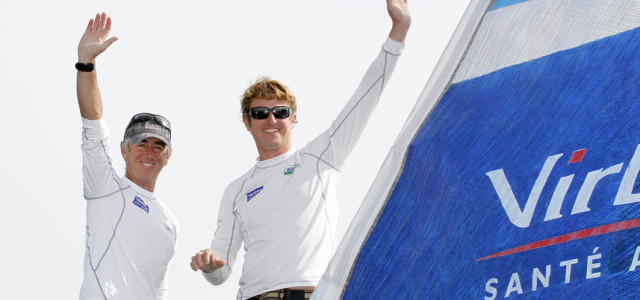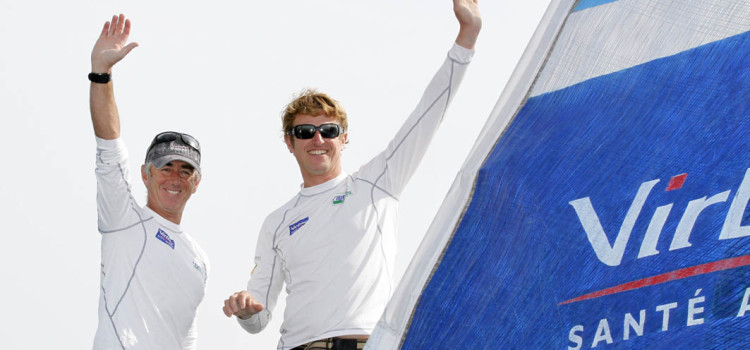

Barcelona World Race, Virbac Paprec 3 in trionfo
Barcelona World RaceIMOCA 60Level ClassOceanoVela 4 Aprile 2011 Zerogradinord 0

Video courtesy Barcelona World Race.
Barcelona – Si è conclusa alle 12.21 di questa mattina la Barcelona World Race di Virbac Paprec 3. L’IMOCA 60 di Jean Pierre Dick e Loick Peyron ha tagliato la linea di arrivo dopo 93 giorni, 22 ore, 20 minuti e 36 secondi di mare. Per Peyron, cinquantunenne, grande protagonista della vela oceanica francese, è il primo successo su un giro del mondo; un’affermazione che arriva dopo il ritiro dall’ultima Vendée Globe, causato dalla rottura dell’albero proprio mentre si trovava al comando della regata. Per Dick, quarantacinque anni, si tratta invece della seconda vittoria in altrettante edizioni della regata. Già nel 2008, a bordo di un altro Virbac Paprec, si era imposto assieme a Damian Foxall. Come nel caso di Peyron, anche Dick si era ritirato dall’ultima Vendée Globe a causa del cedimento della timoneria. Insieme, i due skipper francesi, avevano già vinto la Transat Jacques Vabre del 2005.
Al pari del primo trionfo, anche in questa occasione Jean Pierre Dick l’ha fatta da padrone, guidando la flotta per oltre il novanta per cento della regata. Durante la discesa dell’Atlantico, l’unico a tenere testa a Virbac Paprec 3 è stato Foncia di Desjoyeaux-Gabart, poi ritiratosi in seguito alla rottura dell’albero. Dopo il tranquillo attraversamento dell’Indiano, e la sosta tecnica di Wellington, il leader si è ritrovato inseguito da Mapfre che, ben portato da Iker Martinez e Xavier Fernendez, ha recuperato gran parte delle 780 miglia di ritardo registrate il 7 febbraio e non ha più mollato la presa fin sulla linea di arrivo.
Durante la circumnavigazione del globo, il binomio Dick-Peyron si è fermato in due occasioni – a Recife, poche ore, e a Wellington, due giorni – per risolvere problemi di natura tecnica e ha stabilito il nuovo record di percorrenza nelle 24 ore per la classe IMOCA 60. Lo scorso 22 gennaio, mentre approcciava Città del Capo, Virbac Paprec 3 ha coperto infatti 506.33 miglia, navigando alla media di 21.2 nodi.
Intervistato subito dopo l’arrivo, Jean Pierre Dick ha commentato: “Questo giro del mondo è stato un insieme di tante cose. Io e Loick già ci conoscevamo e sapevamo di avere due individualità vincenti. Credo che, nonostante i tre mesi passati in mare, siamo in buona forma. Non ho fatto fatica ad adattarmi ai ritmi di Loick. Con Damian era stato tutto più rigoroso, in stile anglosassone. Ci sono un’infinità di immagini che porto con me, ma senza dubbio la più significativa è stato il passaggio di Capo Horn. Eravamo davvero vicinissimi a terra. La Patagonia è davvero magica”.
Un Loick Peyron visibilmente soddisfatto ha aggiunto: “E’ stato semplicemente eccezionale. Era il mio terzo giro del mondo, il secondo in doppio e devo dire che mai, prima di oggi, mi sono sentito così appagato. Credo sia un grande esempio di gioco di squadra e sono contento di averne fatto parte. Il mio momento magico riguarda gli albatross: averli visti vuol dire aver attraversato quell’unico tratto di mondo dove sono soliti volare”.
Per quanto bravissimi nel far camminare la barca e nell’interpretazione della meteorologia, Dick e Peyron non avrebbero mai vinto la Barcelona World Race se non avessero potuto contare sulle straordinarie performance della loro barca, un IMOCA 60 di ultima generazione, disegnato appositamente per la regata dallo studio VPLP e varato ad Auckland nel maggio del 2010. Oltre alle doti prestazionali, Virbac Paprec 3 ha avuto dalla sua l’eccellente affidabilità, dettaglio che è mancato agli altri grandi favoriti: Foncia, Groupe Bel, Mirabaud e President, tutti ritirati per il manifestarsi di problemi tecnici. Viste le potenzialità della barca, Jean Pierre Dick ha già annunciato che la utilizzerà anche per la Vendée Globe del 2012.
Per la diretta streaming dell’arrivo e dei festeggiamenti clicca qui.
Per visitare il sito della regata clicca qui.
Per seguire la regata sul tracker clicca qui.
![]()
BARCELONA WORLD RACE, AND THE WINNER IS…
[Source Barcelona World Race] Breaking the finish line this Monday morning at 10hrs 20mins 36 seconds (UTC) this morning Jean-Pierre Dick (45) and Loïck Peyron (51) won the second edition of the Barcelona World Race on Virbac-Paprec 3, completing the 25,200 miles round the world race in 93 days, 22 hours, 20 mins and 36 seconds at an average speed of 11.18 knots.
For Jean-Pierre Dick the victory repeats his 2007-08 triumph in the inaugural edition of the round the world race for crews of two, when he won with Irish co-skipper Damian Foxall. Today’s win also adds an elusive round the world victory to Peyron’s two previous podium finishes, each ten years apart – second in 1989-90 in the inaugural Vendée Globe solo round the world race, and second in The Race in 2000, for fully crewed giant multihulls.
The French duo highlighted their drive and pace when they set a new 24-hour speed record for IMOCA Open 60-footers of 506.33 miles on January 22nd (average speed 21.1kts)
Without doubt the success of their proven partnership amounts to more than the sum of its parts, even given Peyron’s 30 years of ocean racing successes and Dick’s incredible durability, his appetite for short handed and solo racing, his meticulous, scientific approach and delivery, and his remarkable trajectory towards the top of this exacting and demanding sailing discipline.
Their partnership has never been beaten on the oceans, winning the Transat Jacques Vabre together in 2005 when Dick defended the title he won with Nicolas Abiven. Dick, previously a full time business director who only really turned ‘professional’ in 2002, has joined the elite ranks of Michel Desjoyeaux and Bernard Stamm as the only skippers to have won two solo or two-handed round the world races.
Their winning course displays all the polished hallmarks of a near perfect execution. Their meteo and navigation strategy in each sea and each ocean, around the classic course, which takes in the three great Capes – Cape of Good Hope, Cape Leeuwin and Cape Horn but which, uniquely for the genre, climbs from the south Pacific through the Cook Strait before descending just as quickly back to the hostile ocean – has been almost faultless.
The raw speed of Dick’s newest generation VPLP/designed IMOCA Open 60, launched in May last year in Auckland and with which he plans to challenge for the 2012 Vendée Globe, is now proven. As is the duo’s skill to sail it at the limit for long periods when pressed, but so too is their ability to sail defensively, maintaining high averages to preserve themselves and the boat in more extreme conditions.
Such attributes are underpinned by both skippers sharing the same bitter experience of retiring from the 2008-09 Vendée Globe with damage, both leading at different stages. Peyron spent more time in the lead than anyone before his mast broke, and Dick led in the Indian Ocean before sustaining rudder damage.
Though they made two technical stops for repairs, amounting to a time-out total of 63 hours in Brazil and Wellington, New Zealand, the Virbac-Paprec 3 pair stayed the course to fulfil their ranking as one of the pre-race favourites. Of the 14 IMOCA Open 60s which started off Barcelona on 31st December, four of which were otherwise considered potential winners or podium contenders, Président, Foncia, Groupe Bel and Mirabuad all retired with mast or keel failures.
Dick and Peyron led the race out through the Straits of Gibraltar on January 3rd and after re-taking the lead on January 23rd were never passed. The thrilling duel with Michel Desjoyeaux and Francois Gabart, which forced the red line higher and higher, came to an end when Foncia broke their topmast early on the morning of 25th January.
But Spain’s double Olympic 49er medallists Iker Martinez and Xabi Fernandez in their first ever IMOCA Open 60 race as a duo had been second since Foncia withdrew. From Virbac-Paprec 3’s largest lead of 781 miles over Mapfre on February 7, the Spanish pair pressed the leaders relentlessly, getting to within 8.3 miles of Dick and Peyron in the Pacific on 25th February. But, with a beautifully precise 30-mile hitch to the east to set up early in the South Atlantic high pressure system, the winners avoided the very worst of the light winds and made the better passage of the dominant anticyclone.
Though their difficult return through the Doldrums was as long, slow and challenging as either Dick or Peyron could recall over their careers, Virbac-Paprec 3 emerged with an advantage to build on over a final 16-day marathon upwind slog to lead back into Gibraltar.
Speaking on the boat immediately after the finish, Jean-Pierre Dick commented: “This round the world race has been a mixture of lots of little things. We already knew each other a little and it was the joint experience of both of us skippers as individuals which was key to winning. There are a number of different images that will stay with me from the race. Cape Horn in particular, I have never been that close to it and we could really experience it directly being so close to land. Patagonia is magical – that is my most special moment. We are in good shape after the whole three months, and adapted to Loick’s pace. With Damian it was a lot stricter – in Anglo Saxon style!”
Co-skipper Loïck Peyron added: “It has been exceptional. My third round the world race. The first time was solo, the second with a team and this third time double-handed. And we have won – we led the race in spite of some tough competition. It was a fantastic experience and it is a fabulous feeling to finish and finish so well. Success comes from true cohesion – and we are both complementary. The savoir – faire of the solo sailing world means you really trust the other person. Success is also about having a good machine at your feet. We made a mistake last night – it was probably us relaxing a little before the arrival, but we did a good job. My most important memories are of the albatross – they are quite unique in the world and that part of the planet and we were lucky enough to see them. It has been a real example of team work by the ‘family’. It is a beautiful example of unity and I am delighted to have had the chance to experience it.”
| Vela20513 | In evidenza5780 | |
| Monotipia4083 | Oceano2682 | |
| Altura2394 | Breaking news2238 | |
| Derive1982 | English1641 | |
| America's Cup1528 | Classi Olimpiche1324 |


No comments so far.
Be first to leave comment below.